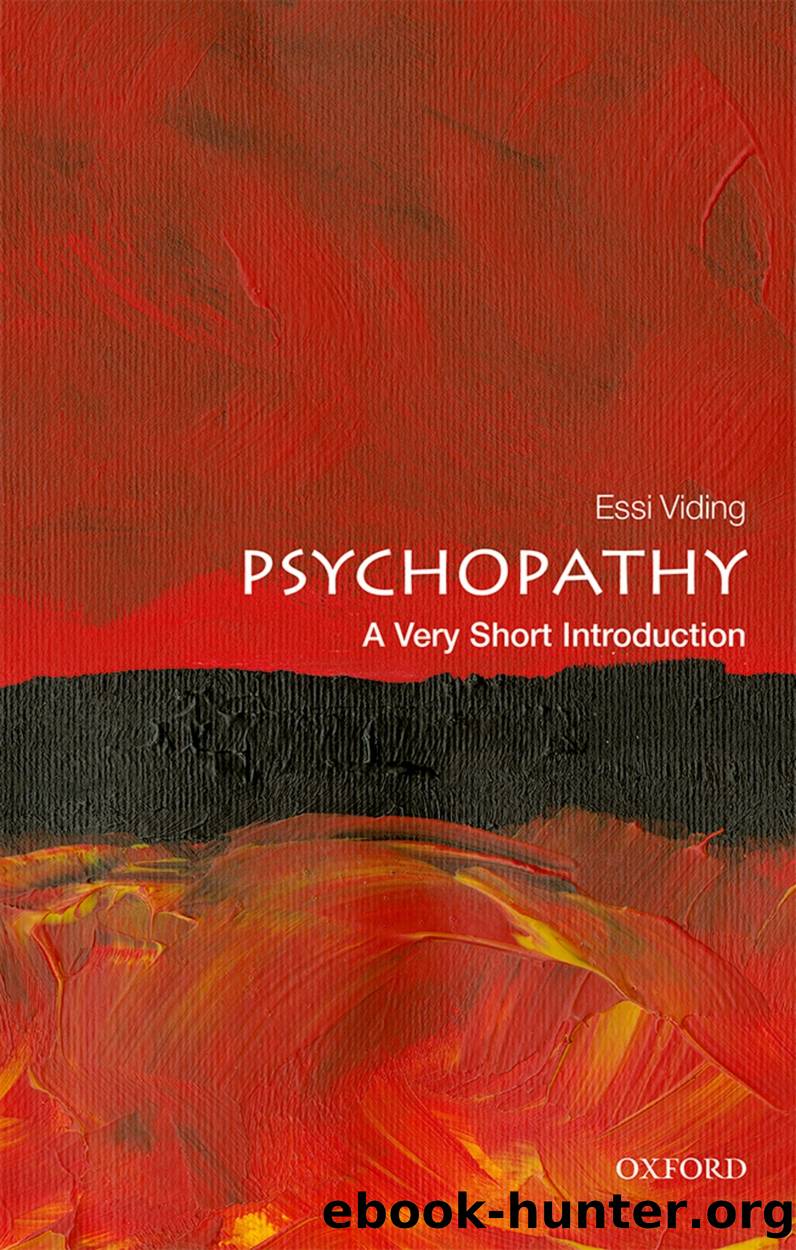Psychopathy by Essi Viding

Author:Essi Viding [Viding, Essi]
Language: eng
Format: epub
ISBN: 9780192523198
Publisher: OUP Oxford
Published: 2019-09-18T00:00:00+00:00
Atypical experience of social reward?
Psychopathsâ behaviour indicates they may have an atypical experience of social reward. Social reward can be defined as the motivational and pleasurable aspects of our interactions with other people. For example, being kind and having close relationships with others is fundamentally rewarding for most people, but perhaps not so for individuals with high levels of psychopathic features. These individuals are antagonistic. They report placing less importance on kindness to others and affiliative, long-term friendships and relationships. We can see this in studies that have focused on surveying real-life behaviour in friendships, romantic relationships, and in the workplace. It is also in evidence in more formal experimental tasks that measure cooperation with others. When doing these sorts of tasks, individuals with high levels of psychopathic traits are less likely to cooperate with and help others. Experimental studies also indicate that individuals with psychopathy may find paying attention to others less rewarding.
Reading this research got my former PhD student Lucy Foulkes and me interested in whether people with high levels of psychopathic traits find affiliative and prosocial behaviour towards others less rewarding than the rest of us. We also wondered whether they might find some nasty behaviours more rewarding than their peers. Prior research had shown that they enjoy antisocial entertainments such as violent sports and video games and also engage in internet âtrollingâ.
Together with a colleague, Professor Craig Neumann from the University of North Texas, Lucy and I developed an instrument to assess different aspects of social reward in adults and adolescents. Lucy called the instrument the Social Reward Questionnaire and, after validating it, she administered this measure alongside assessment of psychopathic traits in both adult and adolescent samples. As we had predicted, individuals with high levels of psychopathic traits reported enjoying prosocial actions less and nasty/dominating behaviours towards others more than their peers. We were not surprised by these findings. Both we and colleagues had regularly observed the kinds of behaviours that would suggest that the motivation for the social behaviour of individuals with high levels of psychopathic traits is unlikely to be similar to what motivates social behaviour for the rest of us. But our findings formalized the âhunchâ that we had before.
The finding that individuals with high levels of psychopathic traits appeared to enjoy cruel interactions have prompted people to wonder about a connection between psychopathy and sadism. Sadism is defined as the enjoyment of controlling, dominating, and/or causing suffering to others, and can refer to physical or psychological suffering. Empirical studies have shown that there is a reliable, but modest, association between psychopathy and sadism (not all psychopaths are sadists and not all sadists are psychopaths). What we do not yet know is why some individuals with high levels of psychopathic traits enjoy cruel behaviour. Is there something inherently pleasurable in causing another person pain (physical or psychological)? And why would this be the case? Perhaps the answer lies in what another personâs pain can signify.
Lucy and I speculated that the enjoyment may
Download
This site does not store any files on its server. We only index and link to content provided by other sites. Please contact the content providers to delete copyright contents if any and email us, we'll remove relevant links or contents immediately.
Should I Stay or Should I Go? by Ramani Durvasula(7639)
Why We Sleep: Unlocking the Power of Sleep and Dreams by Matthew Walker(6684)
Fear by Osho(4722)
Flow by Mihaly Csikszentmihalyi(4666)
Rising Strong by Brene Brown(4431)
Why We Sleep by Matthew Walker(4420)
The Hacking of the American Mind by Robert H. Lustig(4355)
How to Change Your Mind by Michael Pollan(4338)
Too Much and Not the Mood by Durga Chew-Bose(4319)
Lost Connections by Johann Hari(4160)
He's Just Not That Into You by Greg Behrendt & Liz Tuccillo(3871)
Evolve Your Brain by Joe Dispenza(3650)
The Courage to Be Disliked by Ichiro Kishimi & Fumitake Koga(3469)
Crazy Is My Superpower by A.J. Mendez Brooks(3378)
In Cold Blood by Truman Capote(3365)
Resisting Happiness by Matthew Kelly(3331)
What If This Were Enough? by Heather Havrilesky(3297)
The Book of Human Emotions by Tiffany Watt Smith(3282)
Descartes' Error by Antonio Damasio(3261)
